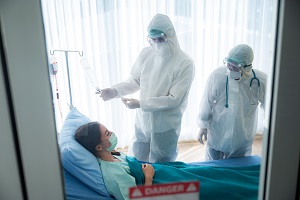Infection Prevention Source control refers to the use of masks to cover a person’s mouth and nose to prevent the spread of respiratory secretions when they are breathing, talking, sneezing, or coughing. Because of the potential for asymptomatic and pre-symptomatic transmission, source control measures are recommended for everyone in a healthcare facility.
Medical face masks should be worn at all times by healthcare professionals (HCP), especially in break rooms and other areas where they might encounter coworkers.
The following Infection Prevention and Control in Hemodialysis Facilities course is designed to educate healthcare providers (HCP) on how to protect yourself/patients and mitigate community transmission of COVID-19 in dialysis facilities. Patients on maintenance hemodialysis have an increased risk of infection due to an impaired immune system and frequent use of catheters or insertion of needles to access the bloodstream.
What You’ll Learn
- CDC Response for Dialysis Facilities
- Screening, Triage, and Management of patients
- Placement of patients with Suspected or confirmed COVID-19
- PPE when caring for patients Suspected or Not Suspected of confirmed COVID-19
- Cleaning and Disinfection
- Response to newly identified patients or HCP with COVID-19
Details
Course length: 45 minutes; CME 0.75
Languages: American English
Key features: Audio narration, learning activity, and post-assessment
ACCME Accreditation
American Medical Compliance is accredited by the Accreditation Council for Continuing Medical Education (ACCME) to provide continuing medical education to physicians. Our Continuing Medical Education (CME) program is committed to enhancing the knowledge, skills, and professional performance of healthcare providers to improve patient care outcomes. Through high-quality educational activities, we aim to address the identified educational gaps and to support the continuous professional development of our medical community. American Medical Compliance designates this activity for a maximum of 0.75 AMA PRA Category 1 Credits. Physicians should only claim this credit for their complete participation in this activity.
Get Certified
American Medical Compliance (AMC) is a leader in the industry for compliance, Billing, and HR solutions. To become certified, please visit us at American Medical Compliance (AMC).
Explore our other courses by visiting the AMC Course Library.
Importance of Infection Prevention and Control in Hemodialysis Facilities
Infection prevention is of paramount importance in hemodialysis facilities, as patients receiving hemodialysis are particularly vulnerable to infections. Hemodialysis is a life-saving treatment for individuals with kidney failure. However, it requires frequent access to the bloodstream. This makes patients susceptible to infections that can lead to serious complications and even death.
Hemodialysis patients often have weakened immune systems due to their underlying kidney disease and the treatment itself. This makes them more susceptible to infections. Additionally, the presence of intravascular catheters or arteriovenous fistulas provides a direct pathway for pathogens to enter the body. Therefore, maintaining a rigorous infection prevention protocol is essential to safeguard the health and well-being of these vulnerable patients.
Infection Prevention and Control
One of the key measures in infection prevention is strict adherence to hand hygiene practices by healthcare providers. Thorough handwashing before and after patient contact helps to minimize the transmission of pathogens. Hand hygiene is particularly crucial when handling catheters, accessing the dialysis circuit, or touching any equipment or surfaces in the dialysis unit.
Another vital aspect of infection prevention in hemodialysis facilities is the implementation of comprehensive protocols for cleaning and disinfection. Dialysis equipment, including machines, chairs, and surfaces, must be regularly cleaned and disinfected to eliminate any potential sources of infection. A clean and sanitized environment reduces the risk of contamination and ensures the safety of patients.
Vascular Access Management
Proper management of vascular access is also critical in preventing infections in hemodialysis patients. Infection rates can be significantly reduced by adhering to sterile techniques during catheter insertion, using aseptic procedures during cannulation, and implementing strict infection control measures for fistulas and grafts. Routine surveillance of access sites and prompt detection of any signs of infection are essential for early intervention and prevention of complications.
Education
Education plays a vital role in infection prevention in hemodialysis facilities. Patients and their families need to be educated about the importance of infection control practices, such as keeping access sites clean and dry, recognizing signs of infection, and promptly reporting any concerns to the healthcare team. By empowering patients with knowledge and promoting their active participation in infection prevention, the overall risk of infections can be significantly reduced.
Regular monitoring and surveillance of infection rates in hemodialysis facilities are necessary to identify trends, implement targeted interventions, and continuously improve infection prevention practices. This involves tracking and analyzing data on bloodstream infections, access-related infections, and other infectious complications. By closely monitoring infection rates and outcomes, healthcare providers can implement evidence-based interventions and measure the effectiveness of their infection prevention efforts.
Benefits of an Online Infection Prevention and Control in Hemodialysis Facilities Course
Online courses offer numerous benefits that make them a popular choice for learning in today’s digital age. Firstly, flexibility is a key advantage. This is because online courses allow learners to access course materials and participate in lessons at their own pace and on their own schedule. Additionally, online courses provide a wide range of subjects and disciplines. This gives learners the opportunity to acquire new skills from the comfort of their own homes. Lastly, the affordability of online courses compared to traditional in-person education is a significant advantage. Online courses make quality education more accessible and affordable for many individuals. With the ability to access course materials anytime, anywhere, online courses offer a flexible, diverse, interactive, and cost-effective approach to continuing education.



